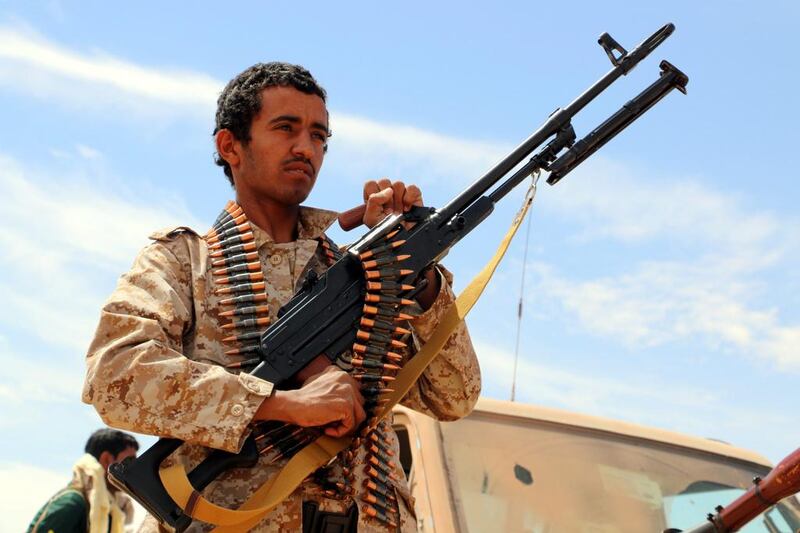Aden // Yemen’s government has called for international action against Hizbollah and for Lebanon to prevent the militant movement from sending its fighters into the country, after a video was made public that allegedly shows a member of the Iran-backed group training Houthi rebels.
The Arab coalition led by Saudi Arabia, which is backing Yemeni ground forces including southern Yemeni fighters and troops loyal to the internationally recognised government, has maintained since the conflict began last year that Iran and Hizbollah are providing military support to the Zaydi Shiite Houthi rebels.
The UN Security Council on Thursday unanimously called for the full implementation of the political transition process in Yemen, and for sanctions imposed on the Houthis and allied forces loyal to the ousted president Ali Abdullah Saleh to be extended for another year. The official Yemen news agency said the resolution would enable the sanctions committee to monitor and freeze nearly US$50 million (Dh183m) looted by Mr Saleh.
Tehran has said it provides the Houthis with only political support, while Riyadh accuses it of trying to turn the movement into a Hizbollah-style proxy force on its border.
The video was first broadcast on Saudi news outlets, and purports to show a Hizbollah operative, identified in the reports as Abu Saleh Al Libnani, speaking with a Lebanese accent and giving tactical military training to a group of Yemeni fighters alleged to be Houthis in a tent at an undisclosed location in Yemen last summer.
The video is largely without audio, but at one point, Abu Saleh says, “I have an operation in Riyadh.” One of the Yemenis asks, “Is it a suicide attack?”, to which Abu Saleh replies, “we call it a martyrdom operation”.
"I call for the Security Council to impose punishments on Hizbollah and all sides that support the Houthi rebels with weapons, according to the resolution of the Security Council that prevents providing the Houthis and Saleh with weapons," Yemen's minister of information Abulmageed Qubati told The National.
Hizbollah officials have not confirmed any role for the group in Yemen, although the group has admitted sending thousands of fighters into the Syrian conflict in support of president Bashar Al Assad.
For their part, the Houthis have not yet denied the veracity of the video.
While the video points to an advisory role for Hizbollah in Yemen, it is unlikely that the group is able to provide much more assistance, given the strain on its resources and the coalition blockade of Yemen’s borders.
“I do not think that the Houthis need more fighters, only trainers, and I do not think that they are so many” because more evidence would have come to light by now, said Ahmed Obaid, an analyst and retired Yemeni military officer in Aden.
Mr Qubati said Hizbollah and the Iranian Revolutionary Guards began supporting the Houthis over the past decade, and ramped up their support since 2011, adding that the trainer in the video probably arrived in Yemen before the current conflict.
“After the coalition forces saved the ports in Yemen, the smugglers of the weapons to the Houthis mostly stopped and the military experts cannot enter the country easily,” he said. Some of them may have entered through the deserted islands off the western coast, “but all of these weapons and experts came to the Houthis during the reign of Ali Saleh”.
He also claimed that Hizbollah played a key role in allying the Houthis with Mr Saleh, their former enemy who had led six wars to crush the group during his 33-year presidency. “Hizbollah is the main engineer of rebuilding relations between the Houthi rebels and Saleh.”
Mr Qubati served as Yemen’s ambassador to Lebanon from 2003-2007, and he said that during his time there Yemeni officials had seen evidence of Houthi fighters training in the Bekaa Valley in Lebanon.
The video’s release comes at a time when Saudi Arabia is leading an aggressive push against Hizbollah and demanding that the weak and divided Lebanese government distance itself from the group.
On Wednesday, the spokesman for the Saudi-led coalition, Brig Gen Ahmed Al Asiri, said there had been mounting evidence that members of the Revolutionary Guard and Hizbollah were providing training to the rebels inside Yemen.
“We are sure of their presence and the evidence gathered today comes to support the file the Yemeni government shall present to the United Nations to put an end to such practices and face the Lebanese government with its responsibilities,” Gen Al Asiri told the Saudi Al Ikhbariya TV station. “Because those individuals carry Lebanese passports and use them to travel and circulate, and at the same time they bring harm to Arab countries and such practices have to be stopped.”
Riyadh continued building its case against Hizbollah on Thursday, accusing the group of working with Houthi rebels to smuggle drugs into the kingdom.
Saudi Arabia has tried to apply more pressure on Hizbollah and Iran following the recent setbacks suffered by Riyadh-backed Syrian rebels at the hands of Iranian and Hizbollah forces supported by Russian air strikes.
Saudi Arabia is leading a charge of Gulf states against Hizbollah’s influence in Lebanon, putting pressure on the Lebanese government to move away from the group.
Last week, the kingdom cut US$4 billion in security aid to Lebanon, saying that Hizbollah had “hijacked” the state. Saudi Arabia also voiced outrage over the country’s Hizbollah-allied foreign minister failing to endorse formal condemnations of mob attacks on Saudi diplomatic missions in Iran.
The kingdom told its citizens to leave Lebanon on Tuesday, citing security concerns. The UAE followed the move by banning its citizens from travelling to Lebanon. Kuwait, Qatar and Bahrain soon told their citizens to avoid Lebanon as well.
foreign.desk@thenational.ae
* With additional reporting from Josh Wood in Beirut





